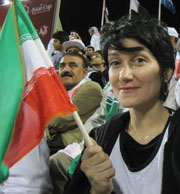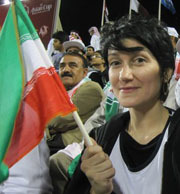New York, May 17, 2011—Bahrain’s crackdown against journalists continues unabated with five new detentions in less than a week, the Committee to Protect Journalists said today. Syria and Iran, one of which is holding Al-Jazeera English journalist Dorothy Parvaz, continue to make intentionally vague or misleading remarks about her whereabouts and physical condition. Meanwhile, Libya announced today that four detained journalists would be released imminently.
In Bahrain, freelance journalist and commentator Abbas al-Murshid was summoned to appear at a police station on Sunday, according to Arabic-language blogs, the Bahrain Center for Human Rights (BCHR), and a Facebook page calling for his release. Al-Murshid is a frequent contributor to the Bahraini daily Al-Waqt as well as numerous online publications, where he has written about Bahrain’s social unrest, corruption, institutional discrimination and other topics considered sensitive by the government. On Monday, al-Murshid called his family to tell them that he has been placed under arrest and then the line was disconnected, BCHR said.
At least four photographers have also been detained in Bahrain in recent days, CPJ research shows. Mohamed al-Sheikh, a freelance photographer and president of the Bahrain Society of Photographers, was arrested in his home on Wednesday, regional online media and blogs report. On Sunday, photographers Ali al-Kufi, Saeed Dhahi, and Hassan al-Nasheet were also taken into custody and had their footage and equipment confiscated, according to BCHR. A human rights campaigner in Bahrain told CPJ that all four photographers had taken pictures of civil unrest in Bahrain and of the government’s violent crackdown, while BCHR said that the confiscations were likely an effort to prevent revealing photographs from reaching a mass audience.

Elsewhere in the region, the whereabouts of Parvaz remain shrouded in mystery. Parvaz went to Syria on April 29 and has not been heard from since, her fiancé Todd Barker told CPJ.
Parvaz, a U.S., Canadian, and Iranian national, was held incommunicado until Damascus acknowledged on May 4 that she was in custody. But a Syrian government statement, issued on May 10, states that Parvaz was “escorted by the Iranian Consul to Caspian Airlines flight 7905 heading to Tehran” on May 1.
Today, Iranian Foreign Ministry spokesman Ramin Mehmanparast said during a news conference that Parvaz had “violated the law in several cases…she wanted to travel to Syria with an expired Iranian passport (as a tourist but) aimed at working as a journalist without asking for relevant permits,” Reuters reported.
Iran neither confirmed nor denied holding Parvaz.
Syria, a country with a poor press freedom record, has intensified its campaign against foreign and local journalists since the outbreak of social unrest in mid-March, CPJ research shows. Iran, according to CPJ research, is the world’s leading jailer of journalists, tied with China.
“If Dorothy Parvaz is in Syrian state custody, that is worrisome,” said CPJ Middle East and North Africa Program coordinator Mohamed Abdel Dayem. “If she’s in Iranian state custody, that’s doubly worrisome. Syria’s record of detaining and otherwise obstructing journalists is atrocious and speaks for itself. Iran’s, as the world’s leading jailer of journalists, is among the worst globally.”
In Libya, government spokesman Moussa Ibrahim said on Tuesday that James Foley, Clare Morgana Gillis, Manuel Varela, and a fourth unnamed journalist, in custody for weeks, would be freed as early as today, The Associated Press reported. Moussa said that preparations were under way for them to leave the country.
